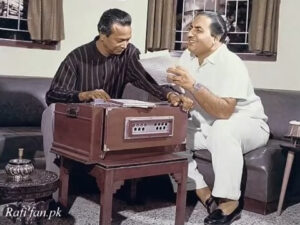Introduction: The Timeless Artistry of Mohammed Rafi
 The legendary Mohammed Rafi’s last song for Naushad Ali, “Jis Raat Ke Khwab Aaye…”, penned by Ali Sardar Jafri, for the film Habba Khatoon, stands as a poignant testament to the artistic yearning of that era.
The legendary Mohammed Rafi’s last song for Naushad Ali, “Jis Raat Ke Khwab Aaye…”, penned by Ali Sardar Jafri, for the film Habba Khatoon, stands as a poignant testament to the artistic yearning of that era.
Rafi’s emotional state after recording the song, a rare moment of creative satisfaction, highlights the impact of technology on artistic expression in Hindi music.
Technology’s Impact on Creativity in Hindi Music
The relentless march of technology has undeniably revolutionized the landscape of Hindi music. From recording and recreating sounds to delivering them directly to audiences, it’s provided a treasure trove of tools for artists. However, a critical question lingers: has this technological marvel come at the cost of artistic expression? While efficiency has improved, the essence of raw, unadulterated emotion in music faces new challenges.
The Golden Age: Where Time Met Talent in Bollywood Music
The bygone era of Hindi music was a testament to meticulous craftsmanship. Veteran lyricists spent weeks meticulously crafting verses, composers meticulously sculpted melodies, and singers honed their vocal abilities through rigorous training. This dedication to their craft resulted in the creation of timeless masterpieces – songs that transcended generations and resonated deeply with the soul. This period truly prioritized the artistic journey over mere production speed.
The Technological Tightrope: Sacrificing Emotion for Perfection
The modern era, however, presents a contrasting picture. The heavy reliance on technology might be inadvertently stifling artistic expression. While digital tools allow for near-flawless recordings and polished soundscapes, they often lack the raw emotions that truly connect with audiences. The emphasis seems to have shifted towards technical perfection, leaving the space for vulnerability and genuine sentiment somewhat diminished in contemporary compositions.
A Turning Point in the 1970s: Creative Decline for Legends
The 1970s marked a significant shift in Hindi music. Technological advancements, while offering new possibilities, also ushered in a decline in creative freedom for artists. Legends like Mohammed Rafi and his contemporaries found themselves grappling with the changing landscape. The emphasis on technical precision seemed to overshadow the importance of artistic merit, leaving these veterans feeling sidelined and creatively stifled by the evolving industry norms.
Expressing Gratitude and Inner Peace: Rafi’s Profound Experience
The final chapter of legendary singer Mohammed Rafi’s illustrious career holds a poignant story. After recording the soulful melody “Jis Raat Ke Khwab Aaye…”, Rafi Sahab reportedly experienced a profound emotional shift. Deeply moved by the song, Rafi Sahab expressed his feelings to Naushad Ali. He stated that singing “Jis Raat Ke Khwab Aaye…” had brought him immense peace and satisfaction, a feeling he hadn’t experienced in a long time. This heartfelt confession hints at a period of creative yearning for Rafi, possibly due to the changing musical landscape of the era.
A Refusal of Payment: The Value of Artistic Fulfillment
When Naushad Ali offered Rafi the customary payment for the recording, Rafi surprisingly refused. He explained that the emotional fulfillment he derived from singing the song far outweighed any monetary compensation. This selfless act underscores the immense value Rafi placed on artistic expression and the deep connection he felt with “Jis Raat Ke Khwab Aaye…”. It stands as a powerful statement on the true rewards of creative work.
Conclusion: A Legacy of Timeless Music and Artistic Integrity
Rafi’s emotional response to his song offers a glimpse into the soul of a legendary artist. It’s a testament to the enduring power of music to evoke profound emotions and inspire artistic fulfillment. The story of “Jis Raat Ke Khwab Aaye…” highlights Rafi’s unwavering artistic integrity even in a changing industry, solidifying his legacy as a voice that prioritized soul over mere sound.
+~ Balwant S. Wadhwani
Balwant S. Wadhwani is the founder of RafiFanClub.com. A lifelong devotee and archivist at heart, he has dedicated his life to sheltering the echoes of the Golden Era. His singular mission is to ensure Mohammad Rafi’s divine voice transcends every earthly boundary—traveling to the most humble, distant hearts to unite all souls, regardless of language, caste, or creed, in a shared moment of celestial grace.
